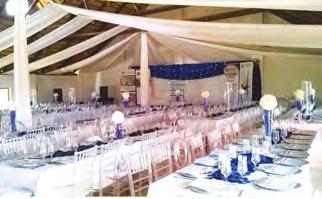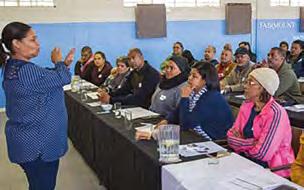
4 minute read
Agriculture
New abattoirs will benefit farmers.
As part of a drive to help more farmers get connected to the more profitable end of the value chain, a beef beneficiation project is under consideration. To be located in the Dr Ruth Segomotsi Mompati District, a feasibility study is investigating whether a public-private partnership for constructing abattoirs and other relevant infrastructure would work.
Advertisement
Another initiative to assist emerging farmers is taking place in the wildlife sector. Although the sector is no longer delivering the spectacular returns of just a few years ago, it is still a potentially very profitable enterprise. To that end, the Provincial Government of the North West is to take excess game from its provincial nature reserves and make them available to emerging farmers. The North West Parks Board will oversee the process and the first donations will be in the order of 600 game animals.
Four district agri-parks are intended to establish sustainable agroprocessing, promote food security and bring black businesses into the mainstream economy. Each of the agri-parks has a specific focus: • Springbokpan: grain (Ngaka Modiri Molema District Municipality). • Vryburg: livestock, red meat (Dr Ruth Segomotsi Mompati District
Municipality). • Moretele/Makapanstadt: red meat and horticulture (Bojanala District
Municipality). • Maquassi Hills: pork and poultry (Dr Kenneth Kaunda District
Municipality).
Various agro-processing plants are under consideration for the city of Mahikeng: a feedlot and a meat-processing plant, including an abattoir and packaging facilities. In Taung the plan is to establish an animal feed-manufacturing plant. A 10ha vineyard in Ventersdorp is to be expanded to 40ha and a black-owned logistics co-operative has been signed to distribute products from the farm.
The Kgora Agricultural Institute in Ramatlabama, about 25km north of Mahikeng, trains small-scale farmers in raising animals and crop farming and works with young people.
Kalahari Red goats. Credit: SA Boerbok Sector Insight Emerging game farmers are to be given a headstart.
Regional variety
The dry western region of the province is home to large beefcattle herds, and this is where the growing game-ranching and hunting industry has its base. The eastern and north-eastern parts of the province receive relatively good rainfall and are suitable for the cultivation of crops.
The North West has approximately 1.6-million beef cattle, representing 12% of South Africa’s herd. Major breeds include Simmental, Brahman, Bonsmara and Simbra (pictured), a cross between the Brahman and Simmental breeds. Kalahari Red and Boerbok goats are found in large numbers in the dry west. The number of goats for the province is estimated at 701 587 which is 12% of South Africa’s total. There are estimated to be 318 843 pigs, which is 20% of South Africa’s total drove.
Nearly two-million hectares is planted with summer cereals, with about 50 000 hectares given over to winter cereals. The North
West produces about 20% of South Africa’s maize and about 15% of its wheat. The central and southern sections of the province are dominated by maize and wheat farming. When it comes to sunflower seed, North West is responsible for 33% of South Africa’s stock, and 23% of the nation’s groundnuts. The North West supplies 5.4% of South Africa’s potatoes, but parts of the Kalahari are ideally suited to the cultivation of seed potatoes.
The North West is sometimes called “The Texas of South Africa” for its superb cattle herds, but it also produces good crops of onions and other vegetables. Proximity to the large urban concentrations of Pretoria and Johannesburg are advantages for the horticulture subsector.

Companies
When South Africa’s first alternative stock exchange in South Africa started trading in February 2017, the first listing was agricultural company Senwes and its holding company. Senwes has a strong grain division and it controls 68 silos. Its headquarters are in Klerksdorp and in 2019 it increased its stake in KLK so that it now controls 57.44% of the company most strongly associated with the Northern Cape.
Suidwes is based south of Klerksdorp in Leeudoringstad. More than 90% of the shares in the company are held by farmers. Grain handling is the main business and there are divisions for retail (17 outlets and one animal-feed depot), mechanisation, finance and research and agricultural economics (Terratek).
Brits is the location of the headquarters of the MGK Group. The company runs five divisions and a plant that makes full-fat soy, a component in animal feed. NWK is another company with manufacturing capacity. The Lichtenburg-based enterprise makes liquid fertiliser (up to 10 tons per month), animal feed (Opti Feeds), processes sunflower seeds (Epko), and runs three grain mills. Another subsidiary, Opti Chicks, has a capacity of 600 000 chicks per week.
NWK also deals in grain, runs several retail outlets and has a halfshare (with Senwes) in CertiSure Brokers. The company has 37 silos with a capacity of 2.5-million tons.
AgriNW is the mouthpiece of its affiliated farmers and keeps an eye on policy and laws affecting the sector. It also acts as a supportive network to help its members achieve optimal results. Agri NW is one of the partners in an annual seminar on farming, the Senwes Future Focus, which takes place at Nampo Park, south of Klerksdorp in Bothaville in the neighbouring Free State Province. ■ Credit: Simbra SA
Online Resources
Agri NW: www.agrinw.co.za Grain SA: www.grainsa.co.za North West Department of Agriculture and Rural Development: www.dard.nwpg.gov.za Red Meat Producers Organisation: www.rpo.co.za,










